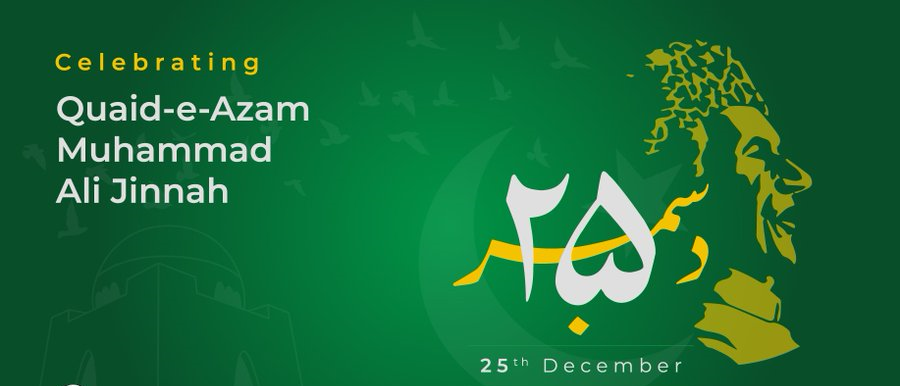
Quaid-e-Azam was a personal hero. But as so often in Pakistan’s history, a tragic one too. Muhammad Ali Jinnah, born 25th December 1876 was expected to follow the family in their business but he rebelled and studied law to become the barrister whose advocacy was to become crucial for legislating for the people and ultimately for the creation of the Pakistani state.
It is probably a timely point in the calendar year to consider his characteristics. Born into a wealthy family of Ismaili-Shia backgrounds, Jinnah clearly transcended such arbitrary divisions given that his sectarian designation was disputed after his death as people claimed he had adopted Sunni’ism. He was someone who was clearly confident of his abilities – when he took up practising as a Barrister in Bombay in 1896, he was the only Muslim Barrister in the city. When he was offered a permanent magistrate position at a salary of 1500 rupees per day, Jinnah was said to reply that he intended to earn that as a Barrister (it was a huge salary at that time).
When he became the Governor-General of Pakistan, he refused a large salary setting it one rupee/month. Contrast that to the politicians since – who have bled this country dry. His faith in his own abilities never wavered and nor his own self-respect – he was offered a knighthood in 1925 for his legislative activities but replied “I prefer to be plain Mr Jinnah”. In August 2022, we had the spectacle of then Army chief General Bajwa becoming the first Pakistani to represent Elizabeth (the UK’s Queen) at the Military Academy in Sandhurst – he considered that “a huge honour and privilege” – somebody must have forgotten to send him the memo that Pakistan had become independent in 1947. Just two months earlier, we saw the Prime Minister Shehbaz Sharif feeding cake to the British High Commissioner, Christian Turner at Elizabeth’s Golden jubilee. The same prime minister went to sign her condolences book not once but twice!
Jinnah also demonstrated courage – once he had been considered an ambassador of Hindu-Muslim unity but his long-standing beliefs that Muslims could be protected in a united India were destroyed by the 1937 elections and he revised his misconceptions. From then on, Jinnah worked to strengthen the League and turn it from factional infighting into an effective political body to realise a Muslim homeland.
Allama Iqbal’s influence on Jinnah cannot be underestimated – so for those who claim Jinnah was purely secular fail to understand him. The principles of liberty, justice and equality are derived from Islam and in February 1948 in a radio broadcast to the US, he stated “The Constitution of Pakistan is yet to be framed by the Pakistan Constituent Assembly, …I am sure that it will be of a democratic type, embodying the essential principles of Islam. Today these are as applicable in actual life as these were 1300 years ago. Islam and its idealism have taught us democracy. It has taught equality of man, justice and fair play to everybody. We are the inheritors of these glorious traditions and are fully alive to our responsibilities and obligations ..” Our Quaid didn’t deny the “Muslim” fabric of Pakistan so perhaps those in the National Assembly and Senate consider carefully when they attempt to pervert Pakistan through promotion of degeneracy not least in the form of transgender acts and interference in the judicial process.
Wolpert who wrote Jinnah of Pakistan in 1984, stated “Few individuals significantly alter the course of history. Fewer still modify the map of the world. Hardly anyone can be credited with creating a nation-state. Mohammad Ali Jinnah did all three.”
Pakistan has yet to produce another leader of the calibre of Jinnah – who had intelligence, drive, tenacity and ultimate belief in Pakistan who took on not just the Hindus of India but the entire officialdom of Britain – and won. His death on 11 September 1948 was a huge blow to Pakistan and that reverberates through to the current day. If Jinnah had had a few more years, perhaps our institutions could have had technocrats at the helm but the ifs don’t help us.
I look at the Government of Pakistan’s tweets and despair. In the lead-up to the Quaid’s birthday, they’ve been quoting him. After the disgraceful treatment of Balochi protestors in Islamabad a few days ago and the ongoing massacre of the Palestinians is there no sense of irony when they tweet Jinnah saying “Democracy is in the blood of the Muslims, who look upon complete equality of mankind and believe in fraternity, equality and liberty”? Jinnah was very clear in his views on Israel: “This is a dagger thrust into the heart of the Nation. Israel is an illegitimate state. Pakistan will never accept it”. Our current leadership should bear those words in mind – particularly when they utter vague statements about an unacceptable “two-state solution”. There are no two states. There is one – and it’s called Palestine. Another tweet quoted the Quaid saying: “The true strength of a nation lies in the character of its people. We must cultivate the virtue of honesty, integrity and hard work” – are these examples set by any of the leaderships over the last 30 years?
Why hasn’t Pakistan had another Jinnah? Could it be because meritocracy isn’t the basis of any institution? Could it be because any talent is extinguished? My brother Farooq had a passion for this great country and whether you think it hyperbole from his sister, would have taken this country on another journey yet he was assassinated at a top 3, very “secure” hotel in Islamabad called Ramada by Wyndham. After Islamabad Police refusing to investigate repeatedly, Additional Sessions Judge Tahir Abbas Sipra rejecting a private complaint and the intervention of the Islamabad High Court where it was recognised that there were suspicious circumstances meriting a trial, we are now to see whether Additional Sessions Judge Sikander Khan intends to deliver justice – a picture of Quaid-e-Azam hangs on the wall behind him as is de rigueur in every court and every official’s office so let us see if he puts into practice the teachings of the Quaid.
So, I’ll end with this. As the Government of Pakistan talks of “celebrating” Jinnah’s birthday, it would be more beneficial if we – the Pakistanis – took more time to reflect. If Quaid-e-Azam was alive today, what would he think of us? I’d hazard a guess that he would be ashamed of our disunity, ashamed of our lack of faith and truly ashamed of our lack of discipline.
—–
The Author Dr. Rehiana B. Ali is sister of a UK national and patriotic Pakistani-Kashmiri, Farooq Ali, who was allegedly murdered in a room of Ramada hotel Islamabad more than one and half years ago. In response to her private complaint before Sessions Court Islamabad, the Court has issued process to precure attendance of respondents in the matter at first phase of the adjudication.
—-





